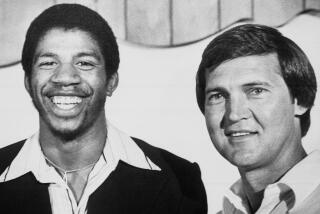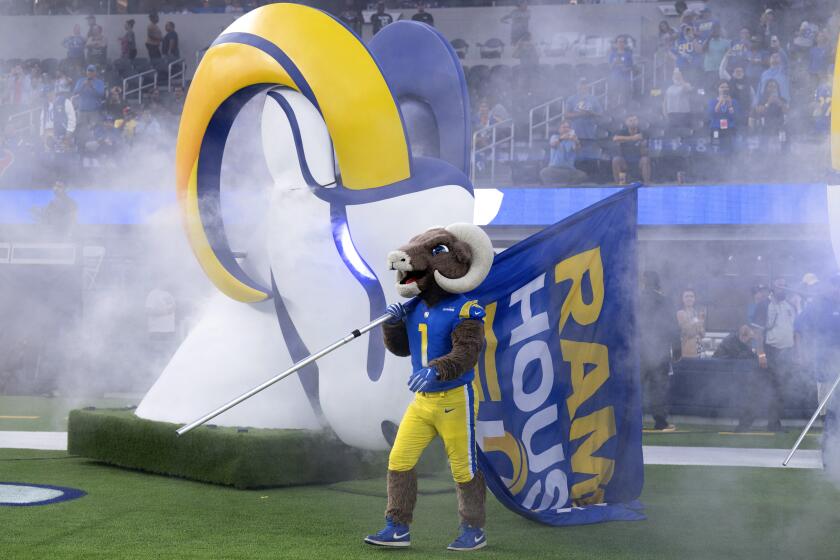King of the Air Is Missing Crown
He’s rich, famous, good looking. He’s the best in the world at what he does. He soars above his sport--literally--the way only a gifted few in history have. His mere image sells shoes, soft drinks, cars and tickets. He’s well-liked, well-rounded and as cheerful as a bluebird.
So why do I feel sorry for Michael Jordan? Why do I look at him and see a tragic figure of history like the prisoner of Shark Island or Joan of Arc or, closer to home, Sam Snead, Ernie Banks, Walter Johnson, O. J. Simpson?
It’s probably because I have this foreboding of doom. Oh, it’s not that I think he will get hit by a truck or drown in the bathtub. I’m beginning to wonder--so is he, I have to think--if he’s ever going to win a championship.
Sam Snead never won the U. S. Open. Ernie Banks never won a pennant. O. J. Simpson never got to a Super Bowl. Walter Johnson never got in a World Series till he was well in his dotage. His famous fastball was gone and his arm creaking before he finally made it.
Will Michael Jordan join this melancholy company of super superstars who never got to put their act on Broadway? It’s like Gable never getting to play Rhett Butler, John Wayne getting shot in the third reel, Caruso singing “Melancholy Baby” in supper clubs.
Oh, it may be too early to don sackcloth and ashes or muffle the drums for Michael. The cortege may be premature. Michael Jordan is only 26 and in the full flower of his youth and vigor.
That’s what bothers you. Here you have Michael Jordan doing these incredible things, feats never before chronicled on a basketball floor. I mean, he’s scored 12,807 regular-season points, he’s brought down 2,459 rebounds, dished off 2,349 assists. He has the highest scoring average of anyone in NBA history. He is one of only two players in the game’s history--Wilt Chamberlain is the other--to have scored more than 3,000 points in a season.
He’s not a guard, he’s an air force. He should play in leather goggles and a white scarf. Basketball’s Red Baron. He’s got more air time than the Wright brothers. He goes to the basket like something taking off from O’Hare. His leaps are so awesome that someone once wondered if he could break Bob Beamon’s 29-foot 2 1/2-inch long jump record.
“He could if they put a basket at one end,” came the retort.
He is so good, you half expect Chick Hearn some night to have to say, “Michael Jordan inbounds the ball to Michael Jordan! Michael Jordan throws a long outlet pass to the top of the key! An Alley Oop! It’s taken by Michael Jordan. Slam-m-m dunk!”
There are some nights you wonder why the Chicago Bulls need those four other players.
That’s just the trouble. You sometimes get the feeling they’re just standing there, open-mouthed, like the rest of the spectators, wondering what Jordan is going to do next. On his good nights, it’s a good thing the ceiling is there or NASA might have to go rescue him. I mean, Magic Johnson is a great player but Michael Jordan is a great team, right?
OK. But where are the championships? I mean, we’re talking a team that has finished third, 21 games behind; fourth, 27 games behind; fifth, 17 games behind; second, four games behind, and fifth, 16 games behind, in years Jordan has played for them.
Part of the problem is, the Bulls aren’t really a team, they’re just kind of a one-man show. You get the feeling those other guys--whoever they are--are just along to train the spotlights, rearrange the scenery, feed the cues and open and close the curtain.
You half expect the anchorman, the star, Michael Jordan himself, to come out afterward carrying a bouquet of roses and say, “Roll the credits!” as he turns and says, “I want to thank all of these people, my cameraman, makeup man, the grips, stagehands, assistant directors, script girls and my producer, God, for making this night possible. Without them, I never could have scored 52 points.”
The question begs to be asked, “Is Michael Jordan too good for his own good?”
Consider that, with the Chicago Bulls, he has scored 774 points more than the second-leading scorer, Scottie Pippen--1,544 to 770. On no other team is the discrepancy that marked.
On the Boston Celtics, Larry Bird has 942 points. But in second place, Kevin McHale has 866. Even Atlanta’s Dominique Wilkins, who starts shooting on the way out of the locker room, leads teammate Moses Malone only 1,153 to 897. On the Lakers, James Worthy leads Magic Johnson by only 978 to 962. At Portland, Clyde Drexler leads Terry Porter, 977 to 818.
Only in New York is the disparity comparable. Patrick Ewing has 1,290 points to Gerald Wilkins’ 688.
You don’t go to a Michael Jordan game to see who wins. It’s like figure skating, freestyle gymnastics. You don’t score the game, you score Michael as if he were Peggy Fleming or Nadia Comaneci. You rate his baskets on a scale of one to 10 on degree of difficulty.
It’s too bad they only count for two points on the scorecard because they are works of art and not at all to be compared to baskets made by, say, Kurt Rambis. Michael would get a 10 if he performed one of his 360-degree turnaround orbital leaps on uneven parallel bars or a floor mat to the tune of “The Stars and Stripes Forever.”
It gets him on the cover of Sports Illustrated and into the boardrooms of Madison Avenue.
But it doesn’t get him in the championship finals.
Will he ever get in? Will the team catch up to him? Or will his ring finger never carry that glittering proof that he was the best of the best?
Even his own team’s annual guide appears to be apprehensive. It notes rather gloomily that, in games in which Michael Jordan scored in the 30s, his team won 29 and lost 11. When he scored in the 40s, the team was 7-8, and when he scored 50 or more it was 2-3.
There is a rule of thumb in pro football that, whenever the quarterback throws the ball 50 or more times, the team loses.
It is a matter of historical fact that, when Wilt Chamberlain went from a shooter to a guy who passed the ball off--he went from 4,029 points in 1961-62 to 1,956 three years later and 1,084 his last full season--his assists soared. More important, he won championships.
When the Chicago Bulls came to L.A. last week, the game was hyped as a matchup between Michael Jordan and Magic Johnson.
Magic doesn’t fall into that trap.
Michael got his 32 points and all the oohs and aahs. The Lakers got the game, 121-103.
After the game, someone wanted to know if the Bulls, like the Germans in 1940, didn’t tend to over-rely on their air force. Michael Jordan considered the question.
“I don’t know,” he said honestly. “It’s something we’re trying to work out. We’re trying to strike a balance, get a formula.”
Sometimes the only formula is migration. Oscar Robertson, as marvelous a player as he was, never even sniffed a championship till he moved to Milwaukee in the sunset of his career. There he was able to find Kareem Abdul-Jabbar--and a title--posted up.
If Air Jordan wants to escape his identity as just another trick-shot artist, he may have to join the ground crew--or the New York Knicks.
The way it is now, the experts may have had it all backward. Michael Jordan is a star. Magic Johnson is a team.
More to Read
Go beyond the scoreboard
Get the latest on L.A.'s teams in the daily Sports Report newsletter.
You may occasionally receive promotional content from the Los Angeles Times.










